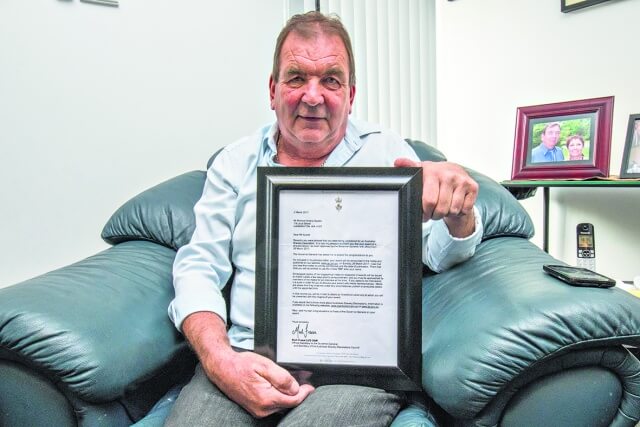
In the early hours of May 6, 2015, Ric Spytek was awoken in his Cannington house by his cat and at first thought somebody may have been breaking in.
When he went to his bedroom window he saw a house fire raging metres away at his elderly neighbours’ property.
“I ran around there and the wife was coming out,” Mr Spytek said.
He was concerned the husband may have had dementia.
Mr Spytek then entered the house through the front door to rescue the man.
The fire was so hot he said if he had arrived any later the elderly man’s fate might have been different.
“Another 30 seconds and he would have died in his home,” he said.
“It was just a wall of flame. It was white hot.”
Mr Spytek said he could not recall any smoke alarms sounding and the elderly man was unable to get up and walk out of the house which had by then become engulfed in flames.
“I picked him up and brought him back to the door.”
Emergency services soon turned up and extinguished the house in about half an hour.
Mr Spytek said he was guided by adrenalin during the incident.
“It’s a bit of a blank really,” he said.

“Why you do it – I don’t know.”
He found out his partner’s daughter had nominated him for his bravery and he was one of 26 people who would receive the award.
Fewer than 1300 of the medals had been given out across Australia since it was introduced in 1975.
The medal was the third highest Australian award for bravery and was given to people who “selflessly put themselves in jeopardy to protect the lives or property of others” according to the Department of the Prime Minister and Cabinet.
The award will be presented at a ceremony later this year.
Mr Spytek said his family was glad he would receive recognition. He said he was also glad to save his neighbours, who he had known for 23 years.
Department of Fire and Emergency Services District Officer Andy Duckworth said house fires were commonly caused by damaged powerboards, unattended stoves, candles and materials being placed too close to heat sources.
He said it was best to test, clean and check smoke alarms monthly and replace the alarms every 10 years.
“The reality is that a fire can engulf a house within minutes,” he said.
“Even the smallest fires can escalate quickly.”
Mr Duckworth said every household should have emergency escape plan in case of a fire.













